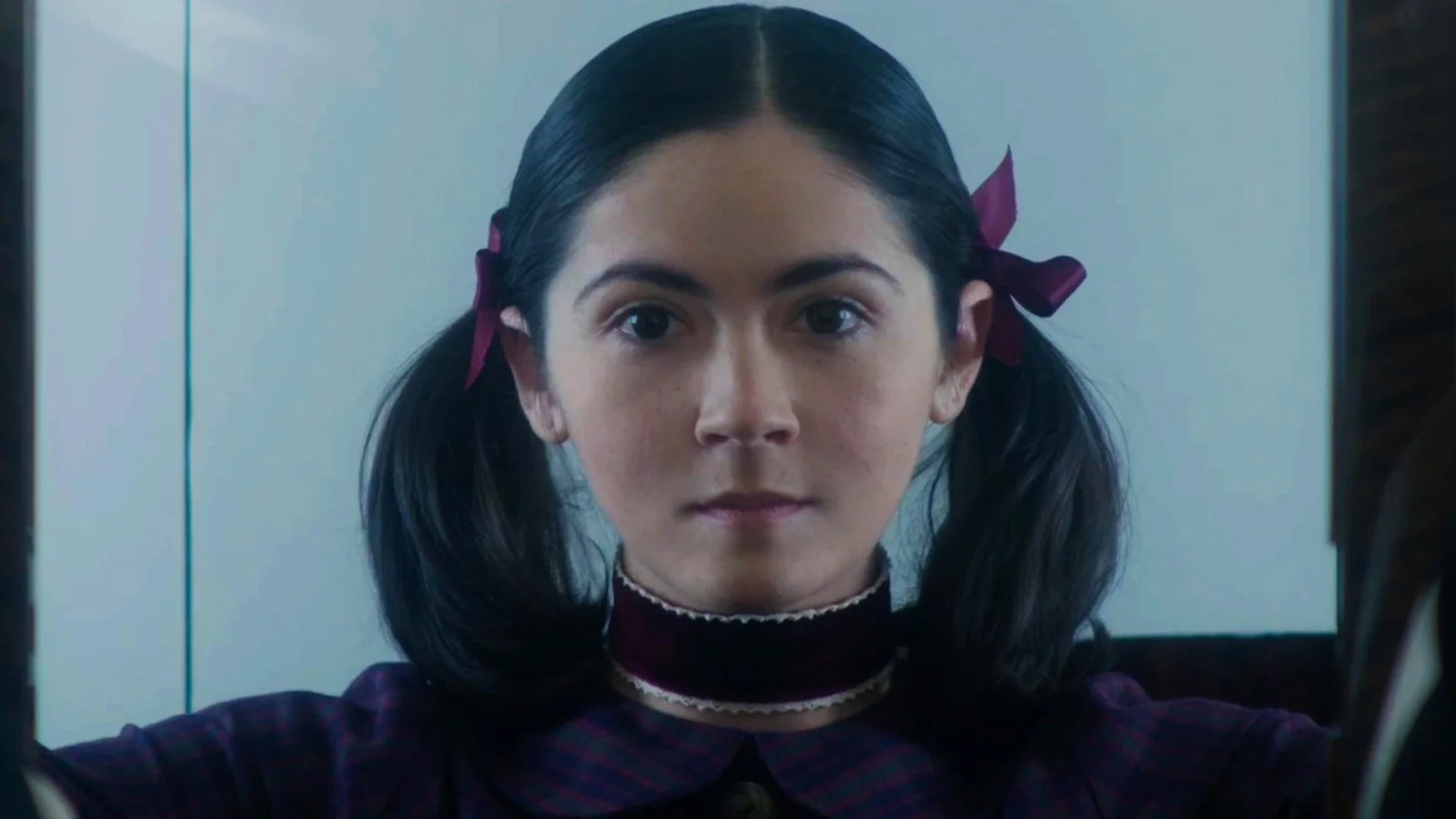ORPHAN: FIRST KILL leans into camp
Directed by William Brent Bell
Written by David Coggeshall, story by David Leslie Johnson-McGoldrick and Alex Mace, based on characters created by Alex Mace
Starring Isabelle Fuhrman, Julia Stiles, Rossif Sutherland
Rated R
Runtime: 1 hour 39 minutes
In theaters, on digital and streaming on Paramount + August 19
by Gary M. Kramer, Staff Writer
The 2009 film, Orphan, featured a fantastic twist in that its main character, Esther (Isabelle Fuhrman)—a nine-year-old murderous girl adopted by a family— was not who she appeared to be. Now comes Orphan: First Kill, an origin story for Esther that puts a spin on that twist, and the fun of this new film is rooting for Esther to get away, repeatedly, with murder.
This prequel opens in Estonia, 2007, where Leena Klammer (Fuhrman) is a patient at the Saarne Institute, a psychiatric facility. As Anna Troyev (Gwendolyn Collins), an art therapist arrives, Leena—declared “the most dangerous patient”—has gone missing. Cue jump scares and some bloody mayhem. Leena soon offs a dumb security guard and makes her escape in Anna—her next victim’s—car. Then, through some internet research, she finds that she could pass herself off as Esther, the young daughter of the Albrights, mother Tricia (Julia Stiles) and father Allen (Rossif Sutherland) who went missing four years ago.
Orphan: First Kill slowly builds its tension as Leena, now Esther, settles into her new “old” family. Her painting skills impress Allen, but her older brother, Gunnar (Matthew Finlan) has contempt for his little sister. Tricia is thrilled to have her daughter back, but she also senses something is different about her. So too does Detective Donna (Hiro Kanagawa) who investigated the original missing person case. As Esther manipulates everyone around her, it becomes only a matter of time before the truth Leena works so hard to protect is discovered—and when it is, she kills and kills again.
It would spoil the fun of the film to disclose Leena/Esther’s secret, although fans of the original already know what that is, and viewers of this installment learn it early on, too. But arguably the best (and funniest) moment in Orphan: First Kill has one character figuring out Leena’s real identity and remarking, “that is beyond fucked up!”
Much of the film depicts an increasingly intense game of one-upmanship between Esther and the Albrights. When Allen and Tricia take a moment to reignite the passion in their relationship, Esther’s jealousy— she’s spying on them in a clever nod to the primal scene— causes her to damage Tricia’s dress for a gala she’s hosting. Likewise, a battle is fought when Esther refuses to eat the special dinner Tricia made for her and Tricia refuses to drink the smoothie her daughter prepared.
Director William Brent Bell does not ratchet up the tension so much as keep the temperature set at a high degree of campiness. Watching Tricia dispose of the smoothie will prompt squeals from viewers as a “special ingredient” is showing flailing in the disposal. Another scene, where Esther is seen driving Tricia’s car as Michael Sembello’s hit song from Flashdance plays on the radio, provides another nice chuckle.
Alas, the murder scenes are too obvious, which is to the film’s discredit; there is just not enough suspense or blood for horror fans. Whenever a character is seen using a knife or a crossbow, it is bound to be employed for killing them later and in an unspectacular fashion. Bell is not very subtle here, and he could have been. A sequence where Esther has an opportunity to kill two people with one stone is so forced it lacks power. Better is a knock-down-drag-out fight Esther has with someone who wants her dead.
Fuhrman has fun playing Leena/Esther, especially when she curses at one of Gunnar’s friends, or flashes a smile before killing. Julia Stiles is surprisingly game as Tricia, and she adds some unexpected layers to her performance. But Rossif Sutherland and Matthew Finlan are pretty one-note in their roles
Orphan: First Kill is best when it is clever like its protagonist, and most enjoyable when viewed through the lens of a dark comedy.


